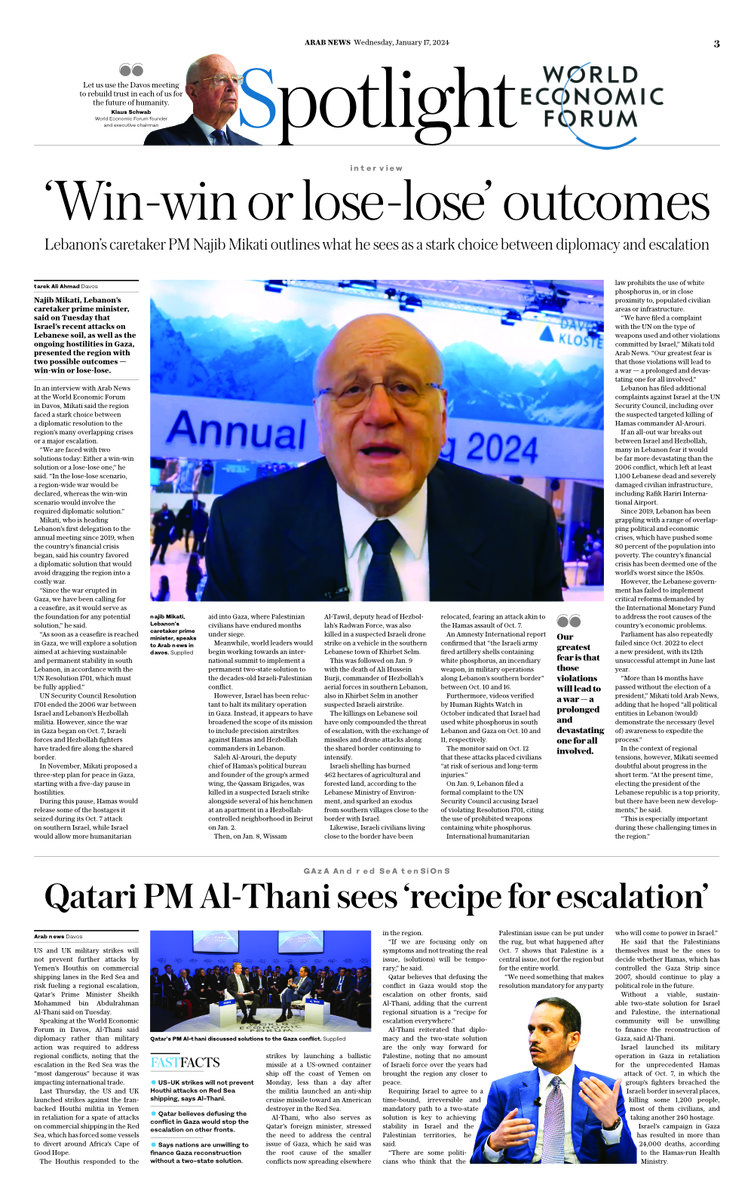DAVOS: Najib Mikati, Lebanon’s caretaker prime minister, said on Tuesday that Israel’s recent attacks on Lebanese soil, as well as the ongoing hostilities in Gaza, presented the region with two possible outcomes — win-win or lose-lose.
In an interview with Arab News at the World Economic Forum in Davos, Mikati said the region faced a stark choice between a diplomatic resolution to the region’s many overlapping crises or a major escalation.
“We are faced with two solutions today: Either a win-win solution or a lose-lose one,” he said. “In the lose-lose scenario, a region-wide war would be declared, whereas the win-win scenario would involve the required diplomatic solution.”
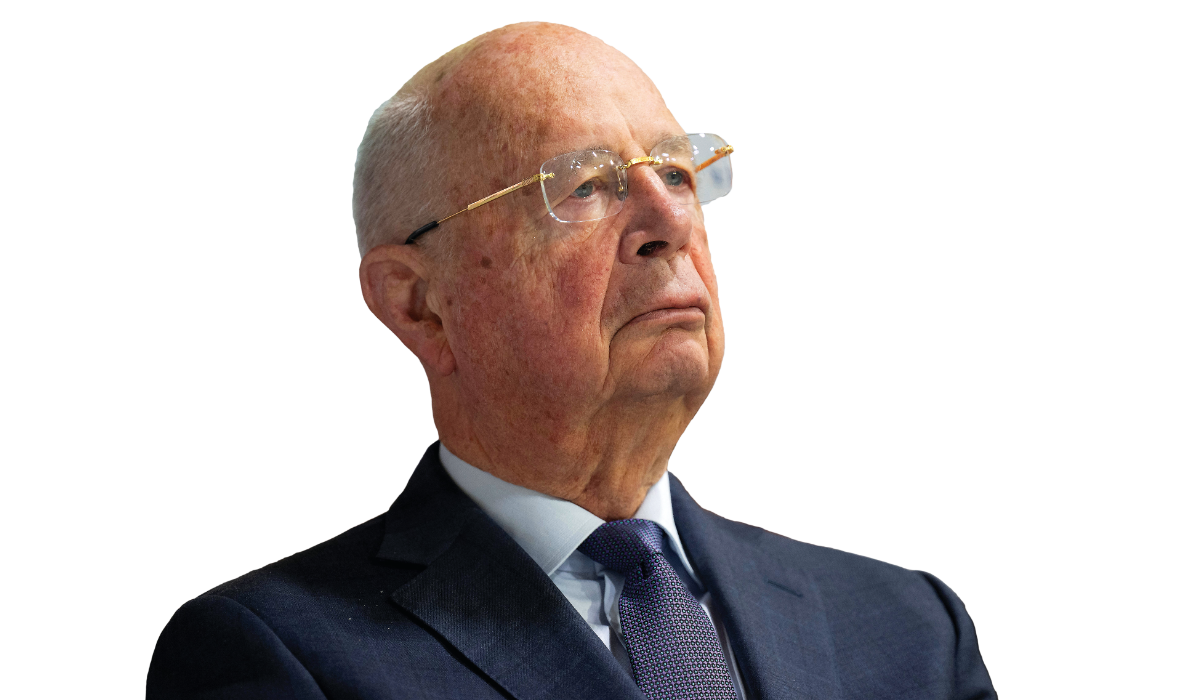
Let us use the Davos meeting to rebuild trust in each of us for the future of humanity says Klaus Schwab, World Economic Forum founder and executive chairman
Mikati, who is heading Lebanon’s first delegation to the annual meeting since 2019, when the country’s financial crisis began, said his country favored a diplomatic solution that would avoid dragging the region into a costly war.
“Since the war erupted in Gaza, we have been calling for a ceasefire, as it would serve as the foundation for any potential solution,” he said.
“As soon as a ceasefire is reached in Gaza, we will explore a solution aimed at achieving sustainable and permanent stability in south Lebanon, in accordance with the UN Resolution 1701, which must be fully applied.”
UN Security Council Resolution 1701 ended the 2006 war between Israel and Lebanon’s Hezbollah militia. However, since the war in Gaza began on Oct. 7, Israeli forces and Hezbollah fighters have traded fire along the shared border.
Our greatest fear is that those violations will lead to a war — a prolonged and devastating one for all involved.
Najib Mikati, Lebanon’s caretaker prime minister
In November, Mikati proposed a three-step plan for peace in Gaza, starting with a five-day pause in hostilities.
During this pause, Hamas would release some of the hostages it seized during its Oct. 7 attack on southern Israel, while Israel would allow more humanitarian aid into Gaza, where Palestinian civilians have endured months under siege.
Meanwhile, world leaders would begin working towards an international summit to implement a permanent two-state solution to the decades-old Israeli-Palestinian conflict.
However, Israel has been reluctant to halt its military operation in Gaza. Instead, it appears to have broadened the scope of its mission to include precision airstrikes against Hamas and Hezbollah commanders in Lebanon.
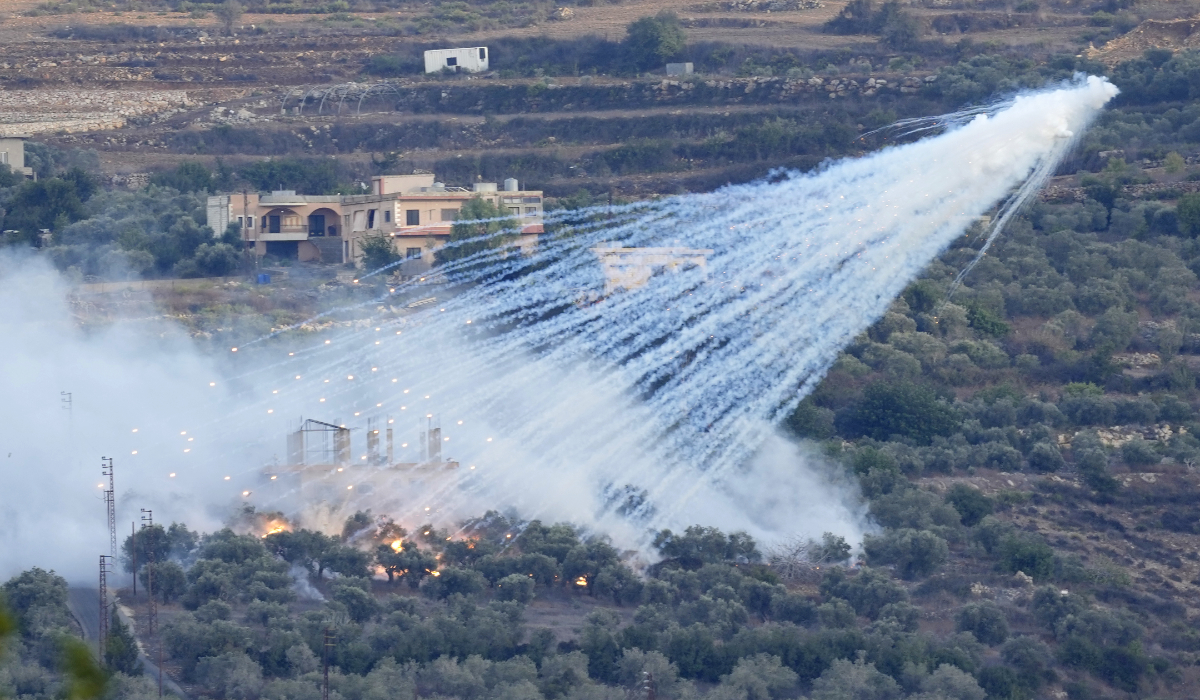
A shell that appears to be white phosphorus from Israeli artillery explodes over a house in al-Bustan, a Lebanese border village with Israel, south Lebanon, on Oct. 15, 2023. (AP)
Saleh Al-Arouri, the deputy chief of Hamas’s political bureau and founder of the group’s armed wing, the Qassam Brigades, was killed in a suspected Israeli strike alongside several of his henchmen at an apartment in a Hezbollah-controlled neighborhood in Beirut on Jan. 2.
Then, on Jan. 8, Wissam Al-Tawil, deputy head of Hezbollah’s Radwan Force, was also killed in a suspected Israeli drone strike on a vehicle in the southern Lebanese town of Khirbet Selm.
This was followed on Jan. 9 with the death of Ali Hussein Burji, commander of Hezbollah’s aerial forces in southern Lebanon, also in Khirbet Selm in another suspected Israeli airstrike.
The killings on Lebanese soil have only compounded the threat of escalation, with the exchange of missiles and drone attacks along the shared border continuing to intensify.
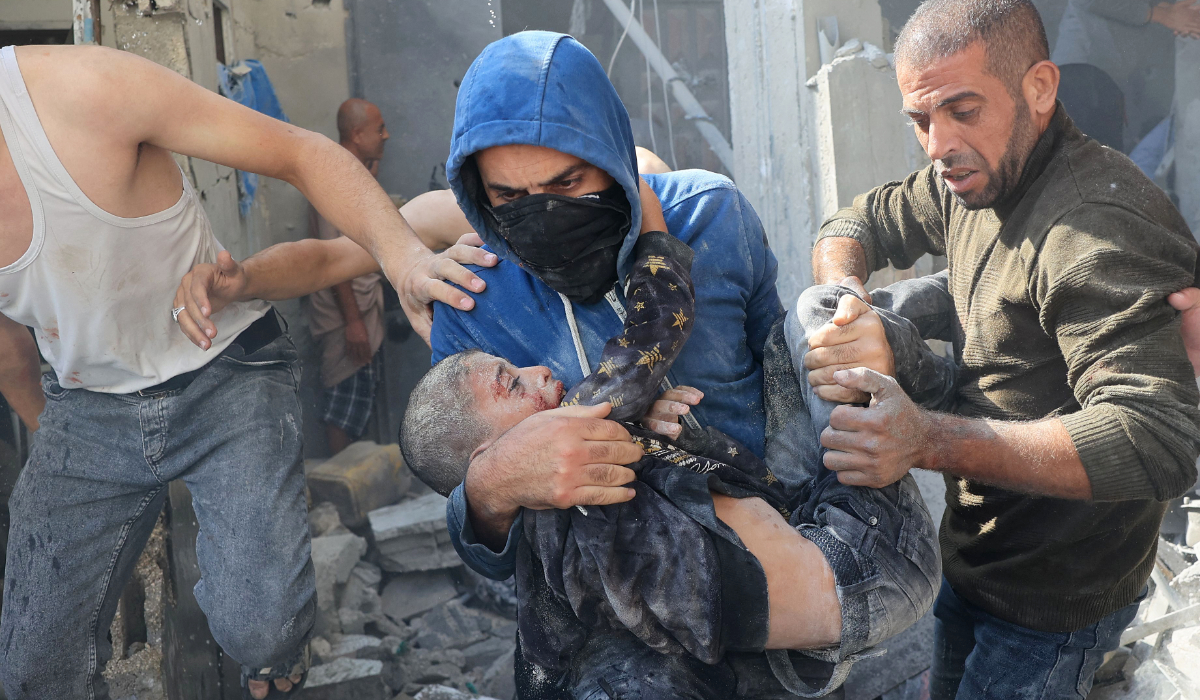
A Palestinian man carries a victim of an Israeli bombardment in Rafah in the southern Gaza Strip on November 7, 2023. (AFP)
Israeli shelling has burned 462 hectares of agricultural and forested land, according to the Lebanese Ministry of Environment, and sparked an exodus from southern villages close to the border with Israel.
Likewise, Israeli civilians living close to the border have been relocated, fearing an attack akin to the Hamas assault of Oct. 7.
An Amnesty International report confirmed that “the Israeli army fired artillery shells containing white phosphorus, an incendiary weapon, in military operations along Lebanon’s southern border” between Oct. 10 and 16.
Furthermore, videos verified by Human Rights Watch in October indicated that Israel had used white phosphorus in military operations in south Lebanon and Gaza on Oct. 10 and 11, respectively.
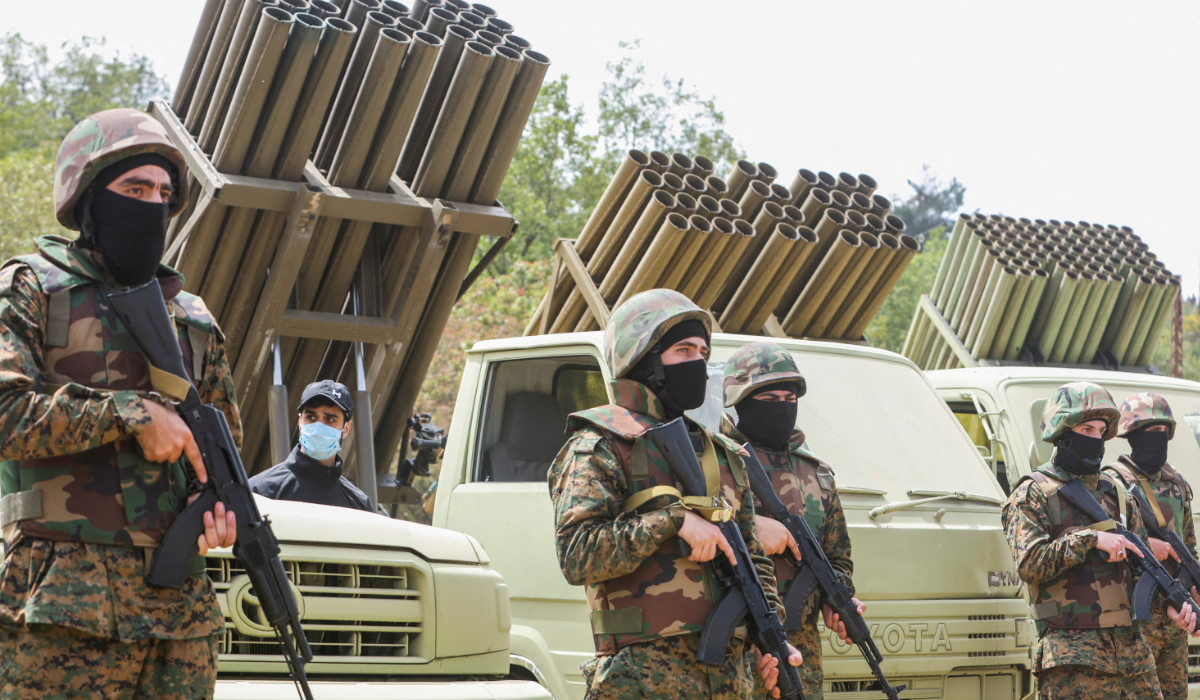
Hezbollah members take part in a military exercise during a media tour organized for the occasion of Resistance and Liberation Day, in Aaramta, Lebanon May 21, 2023. (REUTERS)
The monitor said on Oct. 12 that these attacks placed civilians “at risk of serious and long-term injuries.”
On Jan. 9, Lebanon filed a formal complaint to the UN Security Council accusing Israel of violating Resolution 1701, citing the use of prohibited weapons containing white phosphorus.
International humanitarian law prohibits the use of white phosphorus in, or in close proximity to, populated civilian areas or infrastructure.
This incendiary substance burns at extremely high temperatures and often starts fires that spread and continue until the phosphorus is depleted.
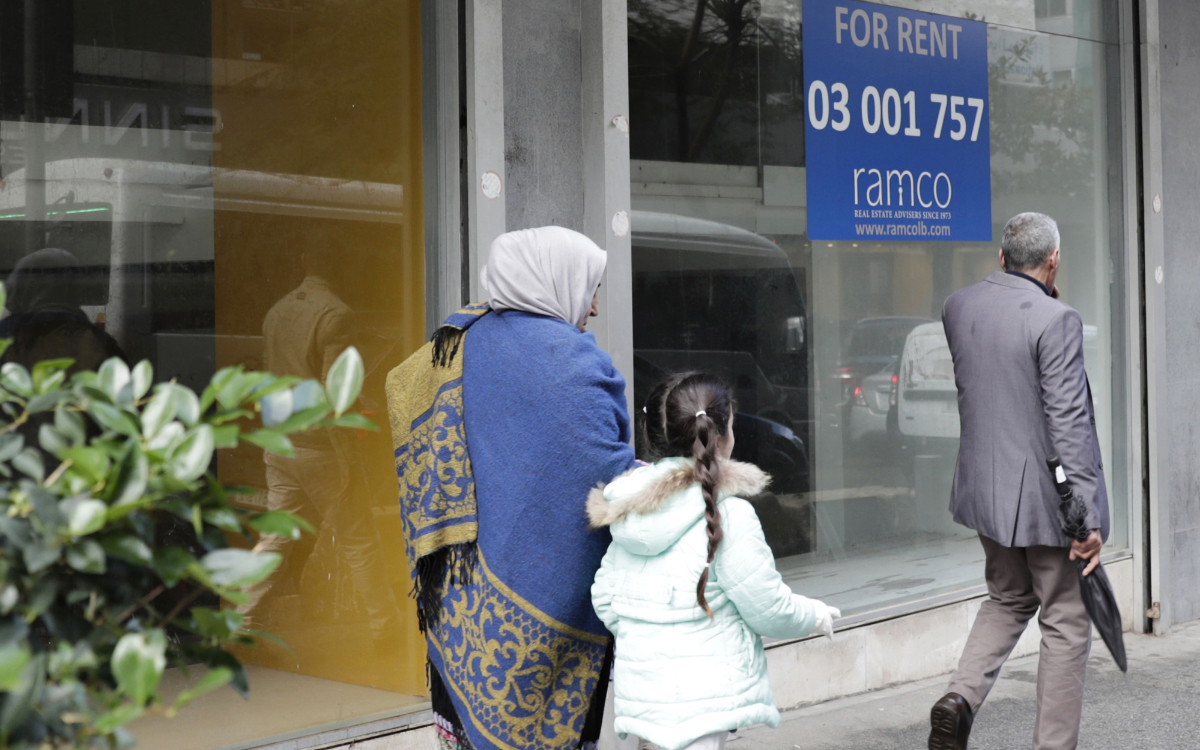
Pedestrians walk past a closed-down shop with a rental sign in the wake of an economic crisis in the Lebanese capital Beirut. (AFP)
People exposed to white phosphorus can suffer respiratory damage, organ failure and other life-changing injuries. Burns caused by the substance are extremely difficult to treat and can be fatal when affecting just 10 percent of the body.
“We have filed a complaint with the UN on the type of weapons used and other violations committed by Israel,” Mikati told Arab News. “Our greatest fear is that those violations will lead to a war — a prolonged and devastating one for all involved.”
Lebanon has filed additional complaints against Israel at the UN Security Council, including over the suspected targeted killing of Hamas commander Al-Arouri.
If an all-out war breaks out between Israel and Hezbollah, many in Lebanon fear it would be far more devastating than the 2006 conflict, which left at least 1,100 Lebanese dead and severely damaged civilian infrastructure, including Rafik Hariri International Airport.
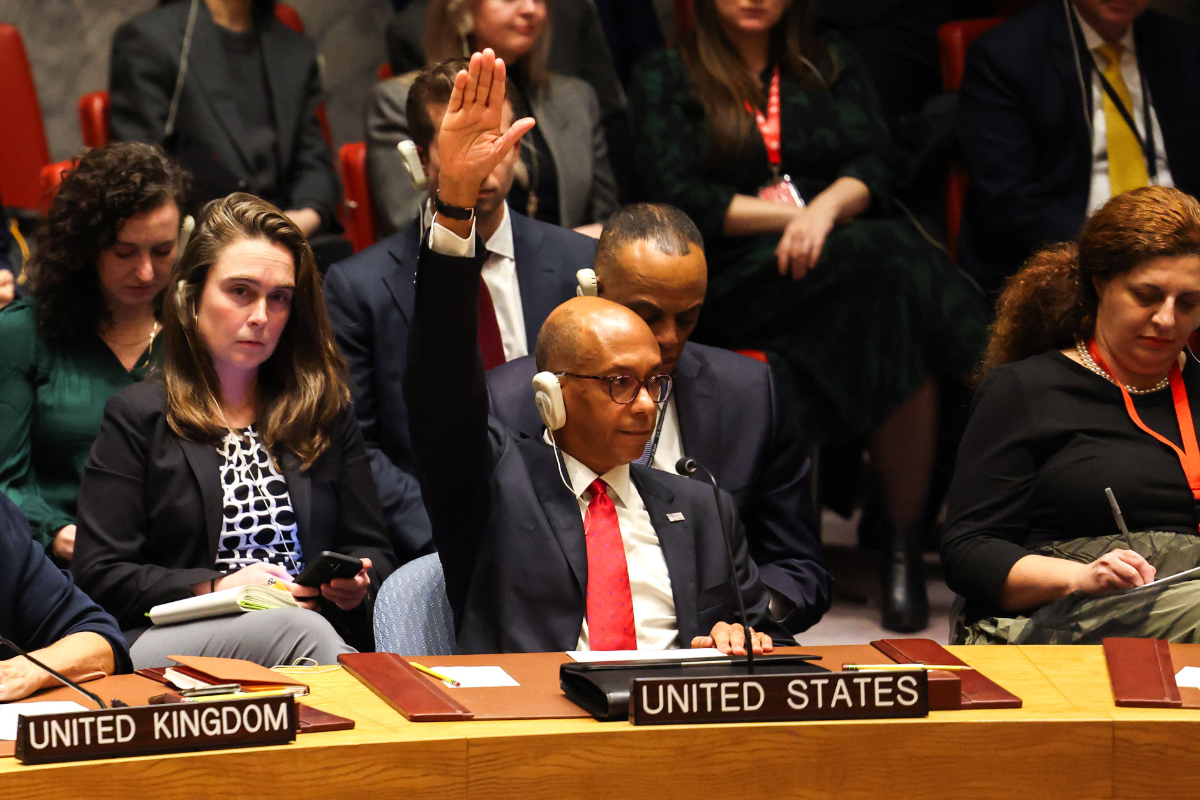
US Ambassador Alternate Representative of the US for Special Political Affairs in the United Nations Robert A. Wood raises his hand during a United Nations Security Council meeting on Gaza, at UN headquarters in New York City on December 8, 2023. (AFP)
Since 2019, Lebanon has been grappling with a range of overlapping political and economic crises, which have pushed some 80 percent of the population into poverty. The country’s financial crisis has been deemed one of the world’s worst since the 1850s.
However, the Lebanese government has failed to implement critical reforms demanded by the International Monetary Fund to address the root causes of the country’s economic problems.
Parliament has also repeatedly failed since Oct. 2022 to elect a new president, with its 12th unsuccessful attempt in June last year.
“More than 14 months have passed without the election of a president,” Mikati told Arab News, adding that he hoped “all political entities in Lebanon (would) demonstrate the necessary (level of) awareness to expedite the process.”
In the context of regional tensions, however, Mikati seemed doubtful about progress in the short term. “At the present time, electing the president of the Lebanese republic is a top priority, but there have been new developments,” he said.
“This is especially important during these challenging times in the region.”
